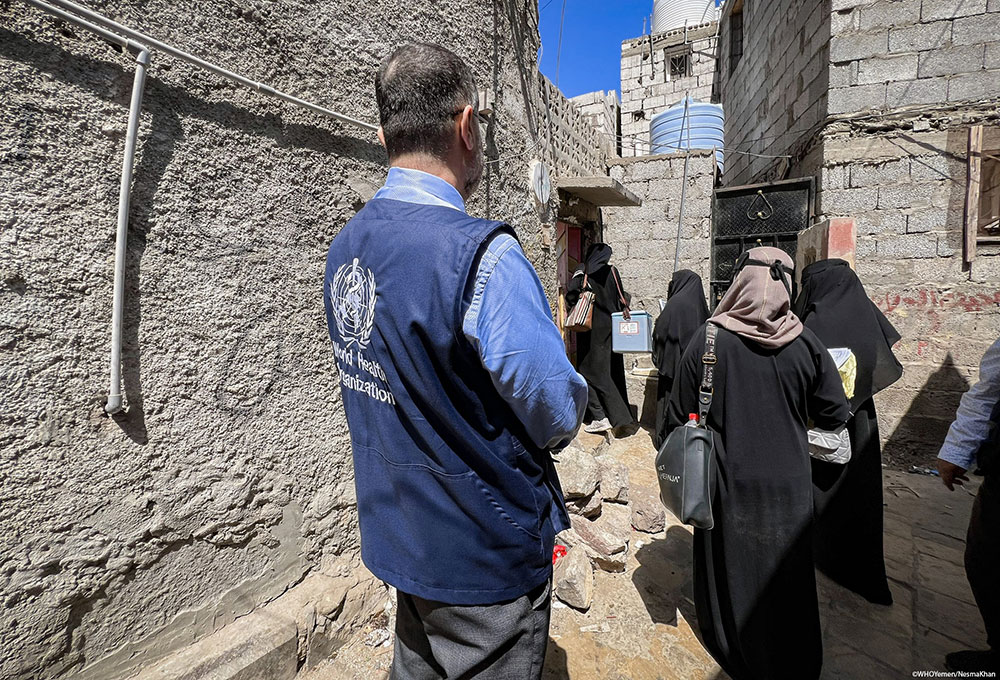 5 March 2024, Aden, Yemen – In just 4 days, a polio immunization campaign in Yemen has reached more than 1.29 million children aged under 5 years. Overall, the campaign achieved 101% coverage, with a range of 89% to over 100%. Yemen’s Ministry of Public Health and Population collaborated with the United Nations Children’s Fund (UNICEF) and the World Health Organization (WHO) to deliver this successful campaign.
5 March 2024, Aden, Yemen – In just 4 days, a polio immunization campaign in Yemen has reached more than 1.29 million children aged under 5 years. Overall, the campaign achieved 101% coverage, with a range of 89% to over 100%. Yemen’s Ministry of Public Health and Population collaborated with the United Nations Children’s Fund (UNICEF) and the World Health Organization (WHO) to deliver this successful campaign.
“This is an important step to protect children from deadly childhood diseases. With confirmed cases of polio among Yemeni children, an imminent threat persists. This is an ongoing risk to the life of every unvaccinated child. Health authorities and donors must continue to work together to ensure universal immunization coverage for all children across Yemen,” said Peter Hawkins, UNICEF Representative in Yemen.
“This is a major achievement in advancing the health outcomes and well-being of children in Yemen. Poliovirus and other childhood diseases can cause permanent disabilities and, in many cases, death. But a small dose of vaccine can provide the necessary protection. There is no reason for children to die of vaccine-preventable diseases. Children are the future, and all investment in their health is an investment in the development of the country,” said Dr Arturo Pesigan, WHO Representative in Yemen.
The campaign was implemented with the generous support of the Global Polio Eradication Initiative. Through this campaign, Yemen joined more than 35 countries in using the novel oral polio vaccine type 2 (nOPV2), which has been granted WHO prequalification. The success of the campaign also resulted from joining forces with health providers who worked hard to reach unvaccinated and zero-dose children to reduce the spread of the disease.
Notes to editors
From 2021 to 2023, Yemen reported 237 variant poliovirus type 2 cases – both circulating vaccine-derived poliovirus type 2 (cVDPV2) and vaccine-derived poliovirus (VDPV). These are known to emerge in contexts of chronic underimmunization. The cases came from 117 districts, and 90% of the affected children were aged under 5 years, while 10% of cases were older children.
Low vaccination coverage and vaccine hesitancy leave children vulnerable to outbreaks of potentially fatal diseases that can easily be prevented. Organized and widespread antivaccination campaigns that misinform the public have also prevented the effective control of disease outbreaks in many communities.
More information
Polio outbreak in Yemen: situation update
Media contacts
WHO Yemen Communications
Email:
UNICEF Yemen Communications
Email:
About WHO
Since 1948, the World Health Organization (WHO) has been the United Nations agency dedicated to advancing health for all, so that everyone, everywhere can attain the highest level of health. WHO leads global efforts to expand universal health coverage, direct and coordinate the world’s responses to health emergencies and connect nations, partners and people to promote health, keep the world safe and serve the vulnerable.
About UNICEF
UNICEF promotes the rights and wellbeing of every child, in everything we do. Together with our partners, we work in 190 countries and territories to translate that commitment into practical action, focusing special effort on reaching the most vulnerable and excluded children, to the benefit of all children, everywhere.








